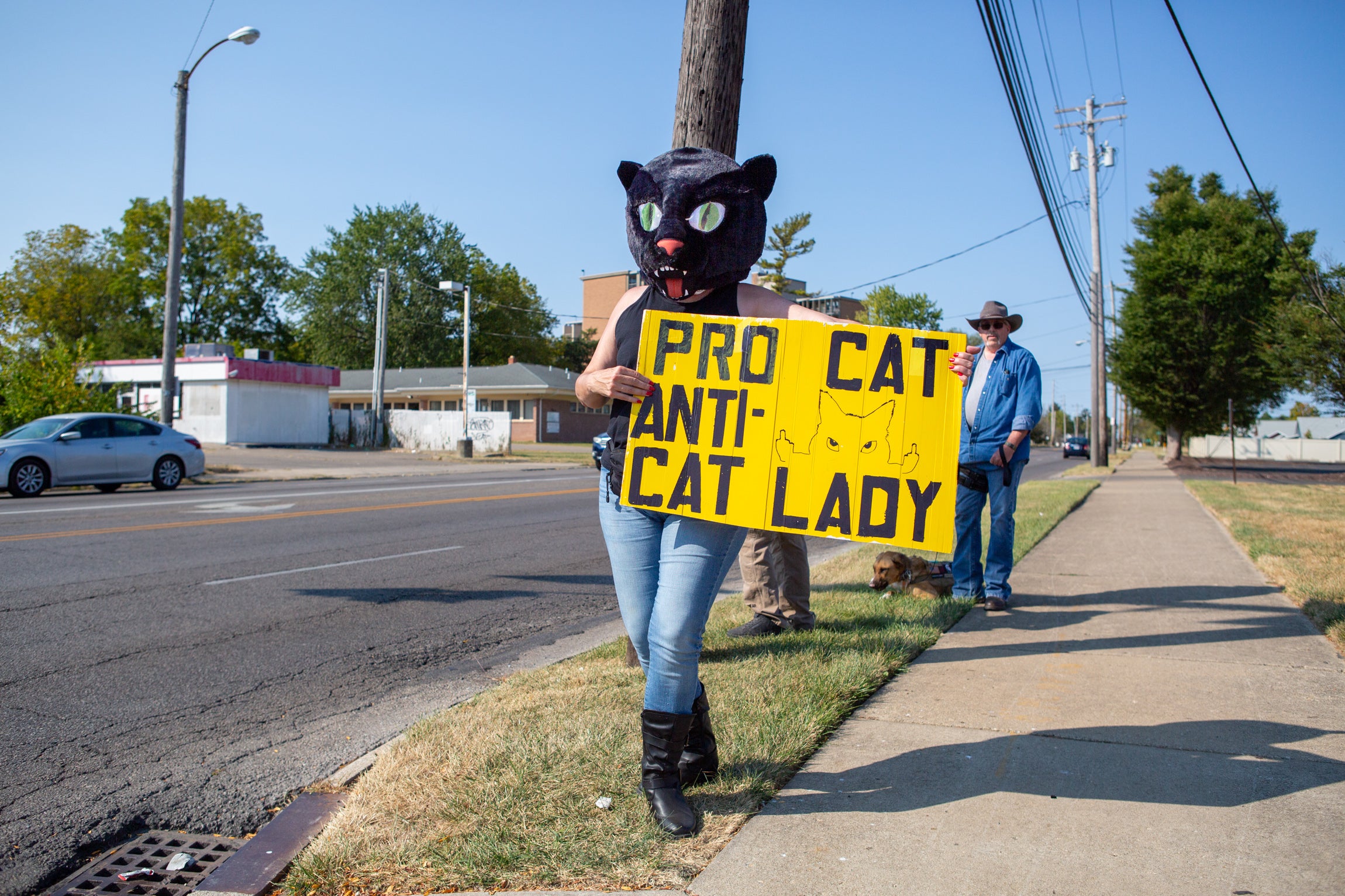
Mia Perez started her Friday early, packing her 9-year-old daughter’s lunch and dropping her off at school before heading to a meeting at a community church in downtown Springfield, Ohio, by 9:30 a.m. For her daughter’s sake, she tried to act like everything was normal.
It wasn’t. Unsettling rumors ignited on the national political stage were swirling through town that local immigrants were stealing and eating pets. The meeting had been organized by town religious leaders who were desperate to counter the claims.

Perez was already nearing her wits’ end at the meeting when her phone rang. Bomb threats had been made in the vicinity of the elementary school, she was told, and parents needed to come back for their children. It was the second day in a row this had happened.
“I spilled coffee all over myself when I got the call,” Perez told me. She rushed to the school and got her daughter. This time, her daughter had questions.
Was it a school shooter, like she had heard about on the news? “I tried to explain the difference between an active shooter and a bomb threat, but how do you explain that to a 9-year-old?” Perez said. Her daughter’s next question was somehow worse: “Have we ever eaten a cat?” Perez’s husband is Haitian. She is Cuban but had lived much of her life in Haiti before relocating to Springfield in 2017.
She is an immigration lawyer and interpreter, helping newly arrived immigrants—mostly Haitians, though not exclusively—get a foothold in town. She told her daughter that, no, they do not eat cats. She tried to make her laugh, telling her everything tastes like chicken to her, anyway.
For Perez’s part, she has cried nearly every day since this all began. I arrived in Springfield last weekend on the heels of Donald Trump declaring at the presidential debate, “They’re eating the dogs, the people that came in, they’re eating the cats. They’re eating the pets of the people that live there, and this is what’s happening in our country, and it’s a shame.
” That followed similar claims propagated by J.D. Vance, Trump’s running mate and an Ohio senator who represents this city in Congress.
The consequences were immediate. White supremacist groups have been seen in town distributing racist fliers and trying to latch broad grievances to nonwhite people living there. There has been vandalism and more than 30 bomb threats, and a steady stream of people from out of town arriving to tell the new locals that they don’t belong there.
Not long after I got into town, I encountered a group of about 30 members of the Proud Boys, some with their preteens in tow, sporting custom-made yellow-and-black biker jackets emblazoned with the group’s logo. One I spoke to covered his face with a bandana and declined to give his name. He said there was nothing racist about opposition to Haitians here.
“We want the government to prioritize Americans over immigrants,” he said. “If you want to come to our country and assimilate, we’ve got plenty of space. But you’ve got to do it our way, adopt our values.
You can’t bring your culture here.” I asked another if she truly believed people were eating household pets in Springfield. “It’s possible they aren’t,” she said.
“It’s just a meme. It’s just for fun at this point.” The Proud Boys were certainly having fun.
But the post-debate weekend I spent in Springfield showed the instant ramifications of campaign rhetoric taken to a disturbing extreme. The people here—longtime residents and new arrivals—had already been trying to fight growing local division. Now it had gone national, and they had no idea what to expect.
I did not find anyone who eats pets in Springfield. But it wasn’t very hard to find a resident who thought it was possible. On his porch near some railroad tracks, Ron, who has lived in Springfield for nearly two decades, sat with Trump flags on either side of him.
His only immediate neighbors are Haitian. “They stare at you,” he said. “I don’t hate them.
It’s just the way they came over here to get all this stuff.” He thinks it’s possible the rumors about pets are true. Ron told me he worked for Walmart for his whole life until about 2012.
When he was 56 years old, he stopped working and has been collecting disability checks and food stamps. “They get more than I ever got,” he said, expressing frustration over the government assistance provided to immigrants. He only gets $23 a month in food stamps.
Ron is Black and resents accusations that this is about racism or bigotry—he said it was about demographic influx—though he maintained he wasn’t so sure the cat rumors were false. He also floated a theory that someone conspired to bring Haitians to replace him and his neighbors. “I see them getting all the houses,” he said.
His own rent jumped from $600 to $800. Ron’s feelings are representative of those of at least some residents here. Tensions in the city began a little less than a decade ago.
As with many midsize cities in Ohio, Springfield’s population shrank sharply after a decline in manufacturing jobs. In the mid-2010s, the city hatched a plan to pitch its potential as an affordable hub to attract manufacturers and bring jobs back. And when several companies did come, they faced a worker shortage.
This, combined with a low cost of living, made the city very attractive to immigrants. Through word of mouth, Springfield ended up with a large number of Haitian immigrants, who, through a federal government program, had temporary protected status in the United States, making them eligible for Social Security numbers and work permits. Many came from Florida, where there is already a large community of Haitians.
Others came directly from Haiti. Some estimate that as many as 15,000 have arrived to work. With that came complications: concerns about jobs, housing costs, local services, roads, and more.
People I spoke to traced the current level of anger and resentment to a horrific accident in August 2023 in which a Haitian driver veered his car into oncoming traffic, causing a school bus that was transporting 52 children to flip over. An 11-year-old boy, Aiden Clark, was killed, and many more were hospitalized. (The driver, Hermanio Joseph, said he was blinded by the sun; police said there was no evidence drugs or alcohol were involved.
A jury found him found guilty of involuntary manslaughter, and he’ll spend at least nine years in prison. The boy’s parents have begged people not to use the situation to fuel anti-immigrant sentiment .) After that, the next City Commission meeting held at City Hall in downtown Springfield, and usually sparsely attended, was packed.
The City Commission is required to meet at least 48 times a year; the five members take public comments and enact local legislation, adopt budgets, determine policies, and more. The several meetings after the crash were dominated by grievances of residents pointed directly toward their new Haitian neighbors. Perez, the immigration lawyer, was in attendance.
She called it a “brutal awakening” for her and other immigrants: “I expected it to be bad, but I didn’t know it was going to be that bad.” Nonimmigrant Springfield residents took turns at the lectern, deriding their new Haitian neighbors as “illegal” and spreading rumors about people harvesting geese from the parks. They said Haitians were uneducated and compared them to monkeys throwing trash out on other people’s lawns, wrecking cars, and driving up the cost of living.
It went on like this for several meetings. One after another, people Perez recognized stepped up to scapegoat the Haitians in the neighborhood for all of their daily ills. “I felt attacked, violated, and dehumanized.
Heartbroken,” she said. One the men she recognized speaking was friends with her husband. I asked if he is still friends with him.
Perez laughed. “No, he is not,” she said. I first met Perez at the St.
Vincent de Paul Community Center. For people new to the country who haven’t yet learned English and are eager to work, the center has been a lifeline. Inside, Christian iconography and American and Haitian flags adorn nearly every shelf.
There were small sets of toys and books to entertain toddlers and young children. Almost everyone assisting in the nonprofit are unpaid volunteers, including people who operate the food pantry and medical clinic. The cross-chatter inside can feel infectious, making it like a big family living room.
Despite the light atmosphere, I could tell things had changed compared to normal. To get inside, I waited outside a locked door until a volunteer could verify who I was. Usually left unlocked, the door was now only opened for familiar faces or those with appointments.
Earlier in the day, police had been called to review security footage showing three suspicious men seemingly casing the building. The executive director of the center offered me cake, but declined to speak on the record, citing concerns after recently being doxed online. No one claimed there hasn’t been strain in Springfield, or real issues.
“We could use help with the driving issue,” Perez said, pointing to concerns about dangerous, unlicensed driving. (That morning, as she was driving, she told me, she had seen someone going the wrong way on a one-way street. “People are looking down to see if that somebody is Black or a Haitian.
Thankfully, it was a white person,” she joked.) Perez said she is part of an initiative to produce instructional material in Creole to address the problem, and thought that the city could also pass some new rules, like requiring a valid driver’s license to purchase a vehicle. Nearly everyone I spoke to mentioned rising housing costs, or raised the specter of houses packed with Haitians willing to pay more than other residents.
But housing cost is also a national problem, not one unique to Springfield, some took pains to remind me. Rachel, a rental property manager in Springfield who asked to be identified only by her first name, said prices are indeed on the rise in the area, but she blamed increased property taxes, higher utility costs, and stagnating wages. “It’s not unique to Springfield,” she said.
“I moved here from the Southwest two years ago, and we were seeing the same trends there.” She said her company inspects units every six months and has seen no instances of families packing into small units: “We’re all feeling the strain, but blaming immigrants isn’t the solution.” Haitian residents I spoke to in Springfield, many of whom passed through a community center at one point or another, told me they have felt the tension since they arrived—but also have been energized by the opportunity.
Harold Herad moved to Springfield in 2022 after first visiting in 2019. “I came to see this beautiful place because a friend invited me. It was quiet, almost too quiet, but I saw potential.
” He came with his whole family. As more Haitians moved in, he felt his transition got easier. Seeing abandoned homes begin filling up, and shops opening up, seemed to be proof that he and other Haitians were benefiting the town.
Herad quickly noticed that some longtime residents were less welcoming than others. He’s been especially horrified to hear people speculate that he’s stealing and eating their cats. But at least with locals in town, he’s still confident they will eventually come around, the more they get to know their new Haitian neighbors.
“We are a resilient nation,” he said. “We’ve faced challenges before, and we’ll face this too. The truth will come out eventually.
” Another recent arrival, James Fleuri Jean, told me that parts of the local support system, like the community center, have helped many Haitian families settle in Springfield, but have also fueled misconceptions about their success. “People think the government is giving us these homes, but the truth is we work hard. We’re always working—overtime, extra shifts, anything we can do,” he said.
He in particular resents the bad-driver stereotypes because he drives for a living. “I drive trucks for Amazon, and I’ve never had an accident. People have accidents everywhere, but when we do, it’s used as an excuse to make us look bad,” he said.
He said Haitians here have grown more wary of neighbors but aren’t letting the moment define them: “We’re not here to convince anyone. We just live our lives and hope that eventually, they’ll see who we really are.” At KEKET Bongou Caribbean Restaurant, Keket, the eponymous owner, told me she was particularly dismayed by the rumors given how she’d sought to share her national cuisine with Ohio.
“It hurts,” she said. “When people say things about our culture without any evidence, it feels like they’re attacking who we are.” The restaurant has been a stronghold in the community, but she confessed that the growing tensions have made her uneasy.
“When I hear bad things, I get scared. I don’t know what’s going to happen next,” she said. Like several others I spoke to, she was holding on to a simple hope: “I think, with time, things will be OK again.
” In Springfield, I expected longtime residents to bristle at the sight of a new outsider, especially with the news. That didn’t happen. The local car rental counter had given me a Ford F-150, and as I drove into town, I got nods.
People didn’t shy away from talking to me about the rumors, either—sometimes more than I wanted to hear. Mark Pearson, who has lived here all his life, told me he had had his own disturbing cat moment. “I found the back half of one on my porch once.
Looked like it had been skinned. That freaked me out,” he said. He does not, however, think a Haitian immigrant tried to eat it.
He suspected an animal or a horrific neighborhood prank. He said he knows several newly arrived Haitians from work and hasn’t had problems, other than the language barrier. At the local Walmart, I began talking to a woman who was loading a large amount of cat food into her SUV.
She said she kept five cats in her home, and joked that they were all accounted for. Nearby, a man stood near his pickup truck, arms crossed, as he explained how the influx of Haitians made Springfield better. “They’re not eating no cats and dogs.
That’s just being made up by racist people,” he said. A group of high school kids that I encountered at Snyder Park—where a particularly vicious strain of the rumor suggested that geese were too afraid to flock anymore—chalked it all up to “old people being racist.” (There were plenty of geese in attendance on Saturday.
) The group was throwing a football around in the grassy area of the park, and they shared their curiosity about and frustration with the rapidly changing dynamics of their town. One student described how the language barrier in schools posed challenges for both teachers and students. “Half of them don’t even know English,” he said.
“It’s really hard to learn when they have to print everything in Creole and English. It wastes class time.” Another student told him, “It’s not their fault.
” “They’re opening shops and stores in places that have been closed for years,” one student pointed out. “They’re contributing, and people don’t realize that.” I asked if any of them have seen any bullying at school.
“These Haitians roll too deep. Nobody is going to mess with like 30 kids at once, and their cousins. We make fun of them, yeah, but they make fun of us too,” one kid said.
“Once they’ve been here a generation and their kids grow up, it’ll get better. They’ll learn from us, just like our families did when they first came here,” another said. “We just need to help them out instead of criticizing them,” one student concluded.
“It’s all a learning process.” On Saturday night, I found myself at a gathering for a brand-new Haitian radio station in town that just happened to plan its debut for this weekend. Miguelito Jerome stood behind a desk with DJ equipment and a microphone.
A handful of other Haitian men, dressed in new suits and flashy jewelry, looked prepared to pop a bottle of champagne. Jerome arrived in Springfield three years ago. He had been operating a furniture business in town, but he shut it down to focus on this new venture in radio, New Diaspora Live .
It will operate out of CoHatch, a trendy market and communal space for events like farmers markets in the heart of Springfield, just across the street from City Hall, itself a sign of the economic resurgence here. Related From Slate Haitian Migrant Kids Have Seen This Before Jerome told me actually prefers the station not be considered Haitian. He insisted it’s intended to be a platform for all residents of Springfield to combat misinformation and promote unity.
There will be programs in English, Creole, Spanish, and more. “The door will always be open,” he said. I asked if that included during live broadcasts.
“Especially then. We’re trying to create a space where everyone can feel heard and understood,” he said. The timing of the radio station’s launch may seem unfortunate, but Jerome didn’t see it that way.
“There’s a lot of fear and confusion right now,” he said. “The Haitian community is very focused on work, but that sometimes leads to social isolation. We need more spaces where people from different backgrounds can come together, talk, and share experiences.
” Popular in News & Politics Two Very Interesting Signs for Kamala Harris After the Debate We Helped John Roberts Construct His Image as a Centrist. We Were So Wrong. The Real Story Behind Trump’s Would-Be Assassin The Ohio Supreme Court Just Greenlit an Egregious “Fraud Upon the Voters” “We have to save Springfield,” he said.
“We’re the builders, the workers, the ones pushing Springfield forward. If we can change things here, maybe we can change the whole country.” That night, I went to another place in town serving Haitian food, Rose Goute Creole Restaurant, in a strip mall in the Southgate neighborhood.
A white couple in the long line said they had come to show support. “On the day that I heard that this community was being accused of those things, I was like, ‘This is freaking ridiculous.’ I was like, ‘We got to come up here and support the community,” one of them told me.
A woman from Boston diverted the route of her cross-country road trip to visit Springfield and eat Creole food. Another man from Texas stopped in during his visit to Columbus. They all were all disgusted by the rumors.
After about an hour, I was finally at the counter. I ordered the fried fish. The manager looked exhausted.
He told me the restaurant has never been busier. I asked him how it made him feel seeing that many of these customers weren’t Haitian. “We feel supported,” he said.
“We never expected this.”.














